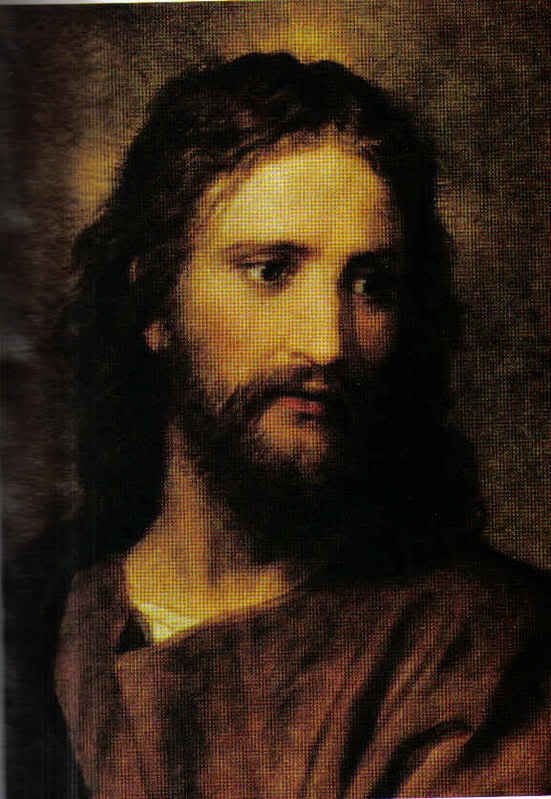From the New Testament, written 1st century
The next day John seeth Jesus coming unto him, and saith, Behold the Lamb of God, which taketh away the sin of the world. Jn 1:29;
I am the living bread which came down from heaven: if any man eat of this bread, he shall live for ever: and the bread that I will give is my flesh, which I will give for the life of the world... Verily, verily, I say unto you, Except ye eat the flesh of the Son of man, and drink his blood, ye have no life in you. Whoso eateth my flesh, and drinketh my blood, hath eternal life; and I will raise him up at the last day. For my flesh is meat indeed, and my blood is drink indeed. He that eateth my flesh, and drinketh my blood, dwelleth in me, and I in him. Jn 6:51, 53-56;
And as they were eating, Jesus took bread, and blessed it, and brake it, and gave it to the disciples, and said, Take, eat; this is my body. And he took the cup, and gave thanks, and gave it to them, saying, Drink ye all of it; For this is my blood of the new testament, which is shed for many for the remission [forgiveness] of sins. Mt 26:26-28;
And as they did eat, Jesus took bread, and blessed, and brake it, and gave to them, and said, Take, eat: this is my body. And he took the cup, and when he had given thanks, he gave it to them: and they all drank of it. And he said unto them, This is my blood of the new testament, which is shed for many. Mk 14:22-24;
And he took bread, and gave thanks, and brake it, and gave unto them, saying, This is my body which is given for you: this do in remembrance of me. Likewise also the cup after supper, saying, This cup is the new testament in my blood, which is shed for you. Lk 22:19-20
And he arose and went: and, behold, a man of Ethiopia, an eunuch of great authority under Candace queen of the Ethiopians, who had the charge of all her treasure, and had come to Jerusalem for to worship, Was returning, and sitting in his chariot read Esaias the prophet. Then the Spirit said unto Philip, Go near, and join thyself to this chariot. And Philip ran thither to him, and heard him read the prophet Esaias, and said, Understandest thou what thou readest? And he said, How can I, except some man should guide me? And he desired Philip that he would come up and sit with him. The place of the scripture which he read was this, He was led as a sheep to the slaughter; and like a lamb dumb before his shearer, so opened he not his mouth: In his humiliation his judgment was taken away: and who shall declare his generation? for his life is taken from the earth. And the eunuch answered Philip, and said, I pray thee, of whom speaketh the prophet this? of himself, or of some other man? Then Philip opened his mouth, and began at the same scripture, and preached unto him Jesus. Acts 8:27-35
(Also, too many Scriptural references to cite, from the Gospels, the Pauline epistles, the book of Hebrews, the epistles of both John and Peter, and the book of Revelations refer to the blood atonement of the Lord Jesus Christ).
Origen lived A.D. 185-254, so the references below will reflect Christianity prior to him:
Let us fix our gaze on the blood of Christ and know how precious it is to His Father, because it was poured out for our salvation and brought the grace of repentance to the whole world. Clement of Rome, 1Clement 7:4 A.D. 80 [96/98?]
For the sake of the love which he had for us did Jesus Christ our Lord, by the will of God, give His blood for us, His flesh for our flesh, and His life for our lives. 1Clement 49:6b A.D. 80
I have learned, however, that certain persons from elsewhere, who have evil doctrine, have stayed with you; but you did not allow them to sow it among you, and you stopped your ears so that you would not receive what they sow. You are like stones for a temple of the Father, prepared for the edifice of God the Father, hoisted to the heights by the crane of Jesus Christ, which is the cross, using for a rope the Holy Spirit. Ignatius of Antioch, letter to the Ephesians 9:1a. A.D. 110
If, then, those who walked in ancient customs came to a new hope, no longer sabbathing but living by the Lord’s Day, on which we came to life through Him and through His death, - which some deny, - through which mystery we received faith, through which also we suffer in order to be found to be disciples of Jesus Christ, our only Teacher Ignatius, letter to the Magnesians 9:1 A.D. 110
...who cannot suffer, yet, for our sakes, accepted suffering, and who on our account endured everything. Ignatius, letter to Polycarp [disciple of the apostle John] 3:2b. A.D. 110
Everyone who does not confess that Jesus Christ has come in the flesh is an Antichrist; whoever does not confess the testimony of the cross is of the devil; and whoever perverts the sayings of the Lord for his own desires, and says that there is neither resurrection nor judgment, such a one is the first-born of Satan. Let us, therefore, leave the foolishness and the false-teaching of the crowd, and turn back to the word which was delivered to us in the beginning. Polycarp of Smyrna [a disciple of the apostle John], Letter to the Philippians 7:1-2 A.D. 135.
Let us, then, continue unceasingly in our hope and in the Pledge of our justification, that is, in Christ Jesus, who bore our sins in His own body on the tree, who did no sin, nor was guile found in His mouth; yet, for our sakes, that we might live in Hm, He endured everything. Polycarp, Letter to the Philippians 8:1 A.D. 135
When our iniquity was complete, and it had become perfectly clear that punishment and death were its expected recompense, and the time came which God had appointed to show forth His kindliness and power, - oh, the magnitude of the kindness and love which God has for man! - He did not hate us nor reject us, nor yet remember our evils. Rather, He was long-suffering, and He was patient with us. In His mercy He Himself took up our sins and He Himself gave His own Son as a ransom for us, the Holy for the wicked, the Innocent for the guilty, the Just for the unjust, the Incorruptible for the corruptible, and the Immortal for the mortal.
Indeed, what else could have covered over our sins except His righteousness? In whom was it possible for us, in view of our wickedness and impiety, to be justified except in the Son of God alone? Oh, the sweet exchange! Oh, the unfathomable accomplishment! Oh, the unexpected benefits! - that the wickedness of the many should be hidden in the One who is just; and that the righteousness of the One should justify the wicked many! Letter to Diognetus 9:2-5 A.D. 125/200
*I’ll stop there, as space doesn’t allow that I should continue in showing that the doctrine of Atonement for our sins through the blood and Cross of Christ was a consistent and foundational doctrine of the early Church (prior to Origen) since it’s inception by Christ Himself.
Amen.
Monday, March 22, 2010
Subscribe to:
Posts (Atom)

